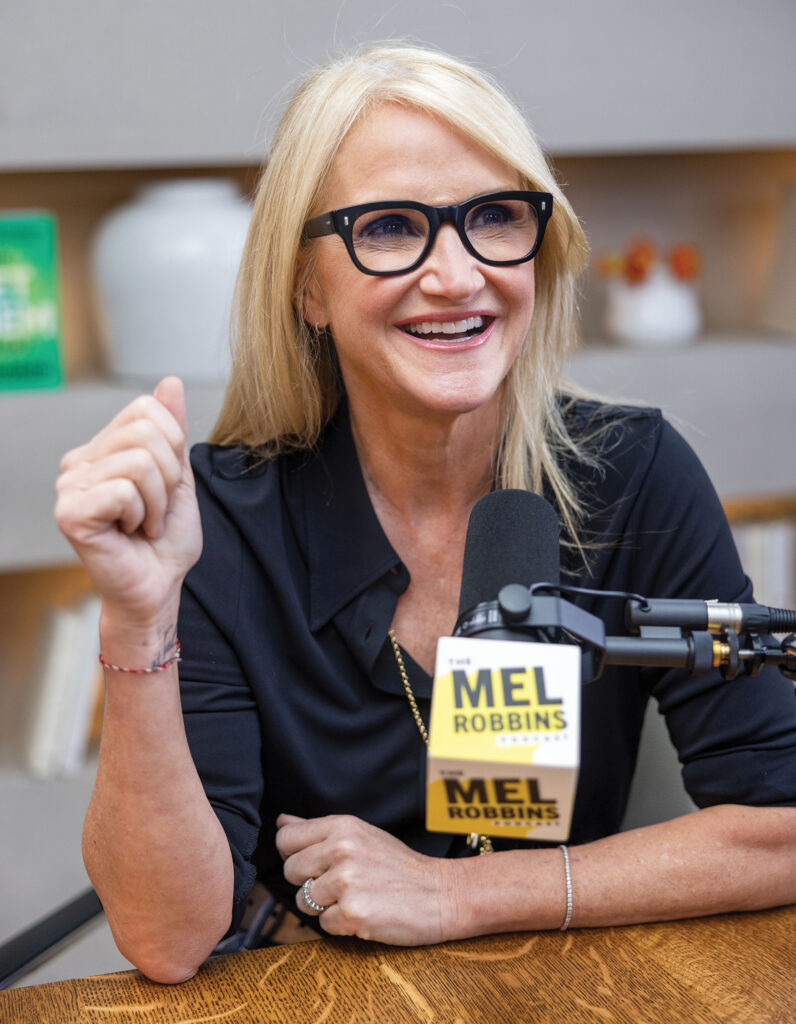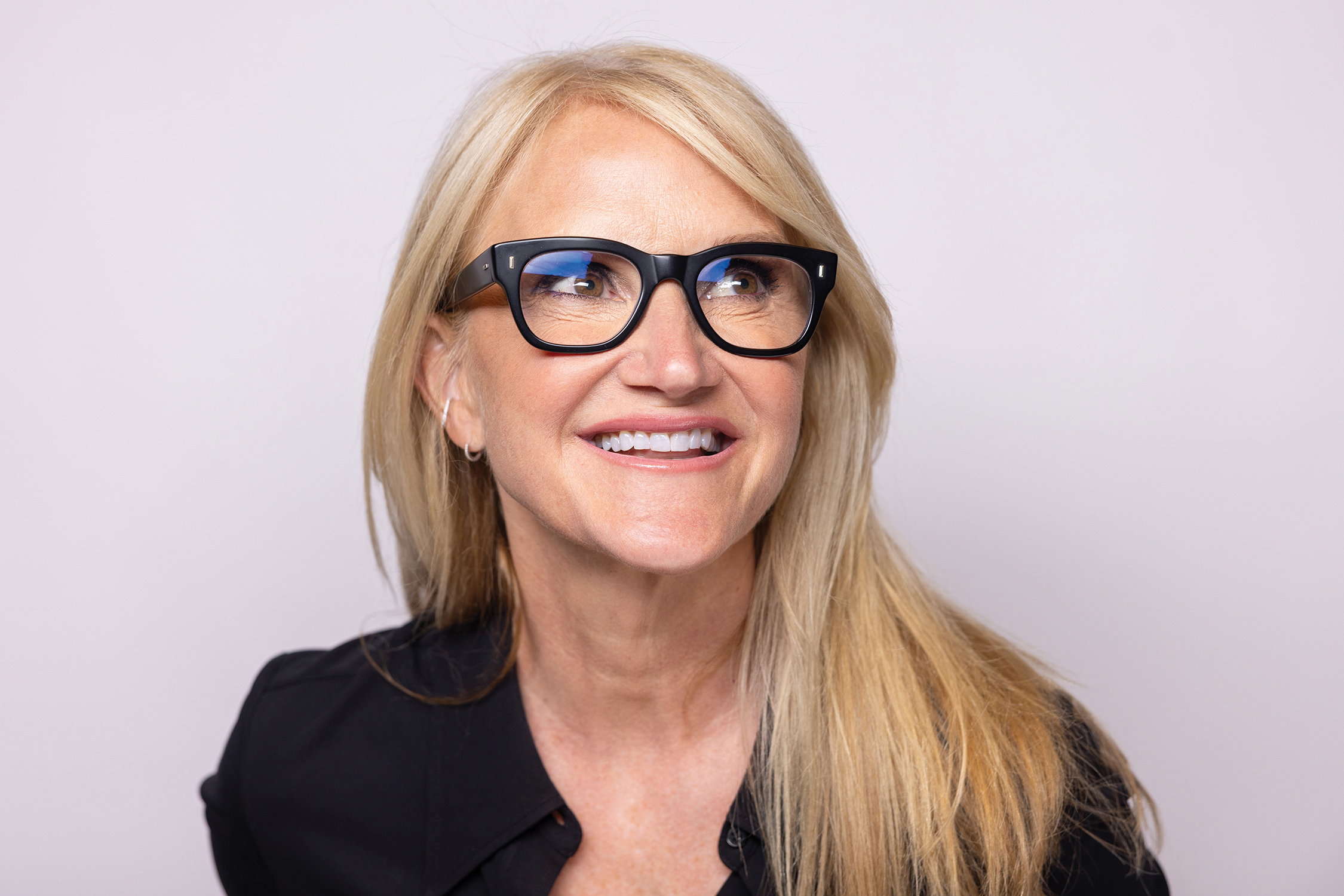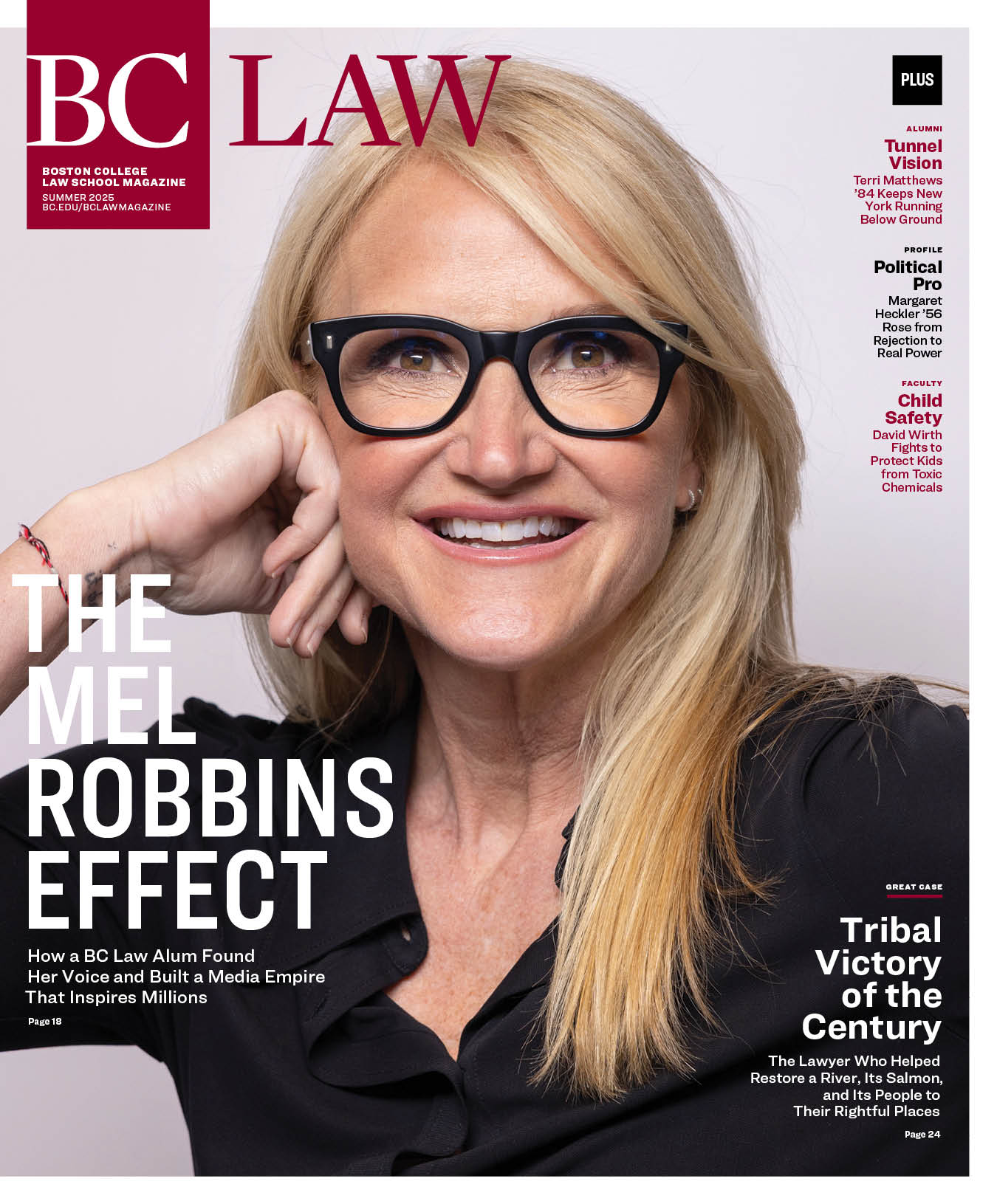Paul Callan ’75 had a front row seat to the Mel Robbins experience long before she started charging for tickets. When he and Robbins were legal analysts for CNN ten years ago, Callan observed her natural talent for dispensing advice along with her innate magnetism, which seemed to compel others to both seek her opinion and prize it.
That was then.
Today, Robbins enjoys roughly 32 million followers on all platforms. Many—count Oprah in this group—consider her to be among the world’s best on the subject of life improvement, mindset, and behavior change. Last fall, SiriusXM renewed her eponymous “The Mel Robbins Podcast” with a three-year deal, including the planned launch of a second show in 2025. Her runaway 2024 bestseller and phenomenon The Let Them Theory, that launched her into the stratosphere, was preceded, in 2017, by The 5 Second Rule, which became the best-selling self-published audiobook in history.
Along the way, she’s been named a Forbes 50 Over 50 honoree, one of USA TODAY’s Top 5 Mindset & Performance Coaches in the world, and she has graced The Hollywood Reporter’s Creator A-List top 50 in 2024. In the meantime, she just squeezed in an international live show tour that wrapped this June in London.
Naturally, her message has spread far and wide, which tends to happen when you have more than 10 million followers on The Gram (along with more than 4 million on Facebook and 5 million on TikTok). In its first twenty-four months, her syndicated podcast generated more than 187-million-episode downloads in ninety-eight countries.
For the dwindling number of uninitiated, Robbins’ Let Them Theory is the nessun dorma of her dynastic reign as a content creator. You can hardly turn a street corner without bumping into someone it’s rescued. Her legal co-analyst Callan experienced this first hand on a visit to California when he walked into a bank and someone recognized him from his screen time with Robbins at CNN.
“Did you ever work with Mel Robbins at CNN?” that person asked.
“Yes.”
“Oh my God, Mel saved my life.”

While her origin story is a bit of a bramble, Robbins still sees a straight line in her rearview that carves an intersecting path through every twist and turn of her fifty-six years. “I reach millions of people every week, but the mission hasn’t changed much: to help someone who feels hopeless, overwhelmed, or lost and help them take the next right step,” she said in a recent exchange with BC Law Magazine. “Whether it’s on a stage, behind a mic, or at a kitchen table, I’m still doing the work that started at Boston College Law School: standing beside people who need someone in their corner, helping them see [a way forward].”
More on Robbins’ Let Them Theory and its co-branded Let Me component in a moment, but this thread of showing up and helping people believe in their own possibility—a “throughline” as Robbins puts it—cuts across every chapter of her life. “She was always someone very tuned into using her education to try to help other people,” said Callan. “Most of us [BC Law alumni] channeled that sentiment into the practice of law. She’s gone a different path.”
Which raises the question: How in the bleep did all this happen?! A decade and a half ago, Robbins was working through some major personal and familial turbulence and toiling in obscurity in a talk radio format so micro that her big promotion was to a 5,000-watt AM station in Orlando, Florida.
The answer, it turns out, is more obvious than it seems.
Robbins’ reasonably fraught bio has been pretty well laid bare in the public space. But pinpointing the magic of Mel is a bit like trying to describe chocolate mousse; it’s better to just dive into the medium. That hasn’t stopped people from trying.
Time magazine gave nods to her voice (“a lively smoky tone with a lot of empathy and a hint of mischief, like a scandalous but wise aunt”), her skill at dropping storytelling cliffhangers before commercial breaks, and her “infallible radar” for finding a core truth amidst a sea of nuance. As attorney and family friend Chris Lucas—who partnered with Robbins enroute to the New England championship in mock trial at BC Law—said in a BC Law Magazine cover story during Robbins’ CNN years, “Mel doesn’t mind doing ‘ready-fire-aim.’ That’s part of her charm, and I think it’s what has propelled her from a media perspective. Nothing phases her.”
In the end, Time probably comes closest: “What Robbins sells … is not just advice. She’s offering her listeners a reason to believe in themselves.”
“That training from BC, combined with the values we learned around justice and the dignity of every person, is still with me. It shows up in how I speak, how I write, how I lead, and how I show up for others.”
Mel Robbins
It’s also very much about the packaging (read: her inimitable production value). And that’s all Robbins. She knows how to flow ideas together; a vestige of her side hustle as a self-promoted, corporate motivational speaker before she landed the CNN gig. Her sense of timing seems effortless, but if you look hard enough behind her eyes, you can see her concocting a pregnant pause, a change of intonation, or a blunt, record-scratch type of retort. The purgatory of AM radio clearly had certain benefits.
Of course, Time also called her “the queen of stupendously obvious advice,” which Robbins owns. “I don’t remember something that’s complicated,” she told the New York Times last winter. “Tools only work when you use them. I think complicated solutions are stupid.”
Plenty of ink has been spilled (to say nothing of bits and bytes deployed) to divine exactly how the 2025 version of Mel Robbins was forged. So, who is this powerhouse? A “brash, brainy, and brutally honest woman,” as BC Law Magazinepreviously described her, who’s supremely comfortable in her own skin and the garments that cloak it. (You might catch her wearing a stylish French cuff blouse under a relaxed, but not-too-baggy, blazer. Yet, she seems equally at home in Northern New England-style denim.)
Fashion tastes aside, from the outside looking in, it does require a smidge of squinting to see a “throughline” from her roots in North Muskegon, Michigan—the kind of hamlet where the mayor is also the dentist or something similarly Rockwellian—to the global platform she enjoys today. As Robbins herself told Katie Couric on her “Next Question” podcast earlier this year, “The way that I got to where I am is, first, I screwed up my own life … I’ve learned over and over and over in my life that no one is coming to save you and that your life is your responsibility.”
Fair enough. And plenty pithy. But a snapshot from Robbins’ time as a burgeoning legal mind may be more illustrative. Working as a public defender in Manhattan after passing the bar, she was plagued by neck rashes caused by pre-trial anxiety. The affliction was pronounced enough for her to conceal it with a scarf or turtleneck, even in summer.
“I want to use whatever platform that I have been given—whether it’s CNN or it’s a stage where I’m being paid to deliver a keynote address or it’s a free downloadable podcast—I want to make people think differently about their lives, about what is possible for them and about the world we live in.”
Mel Robbins
“I would get these big, blotchy neck rashes and I was so scared the jury would think that it meant I was worried my client was guilty,” she said. “I finally realized I might as well just call out the elephant in the room. Over time, I would stand before a jury during voir dire and say, ‘I don’t know why, but I tend to get red as I talk and my chest gets all hivey, and it doesn’t mean this dude’s guilty.’ I made a joke of it. It’s just my genetic makeup. It always got a laugh. And because I stopped focusing on the rashes, they went away.”
That last part is major foreshadowing of Let Them, as it happens. But even before she reached the courtroom, something completely unexpected played out: law school broke her open.
“I struggled. I was overwhelmed and constantly questioning whether I belonged,” she said. “But even in that time of discomfort, something important was happening: I was learning how to think. I learned how to analyze, how to argue, and how to take a complicated amount of information and synthesize it down. That training from BC, combined with the values we learned around justice and the dignity of every person, is still with me. It shows up in how I speak, how I write, how I lead, and how I show up for others.”
The two anecdotes speak to Robbins’ grit and her sublime gift for sussing out coping mechanisms. To be sure, her small-town, Midwest coming of age, her reluctant participation in high school sports, her mom’s “moxie,” and a 2011 TEDx talk that went viral around 2014, all helped catalyze the Dao of Let Them and what is now a supernova of personality. Still, the law and Robbins’ legal training at BC and beyond are best supporting actors.
“[My work as a public defender] changed me,” she told the magazine this spring. “It hardwired something into me. I began to understand that justice isn’t just about the law. It’s about humanity. About compassion. About really seeing someone and treating them in a way they deserve. Dignity and justice don’t usually show up in grand gestures. More often, they are in how you listen.”
In point of fact, when she was with CNN, Robbins leveraged her desire to feel more connected to the organization into a practice of memorizing the names of everyone she interacted with in the building, from the moment she walked in on 58th street (before CNN moved in 2019) all the way up the elevator. “It’s the smallest things in life that make the biggest difference,” she said at that time.

Let Them is, indeed, accessible. It’s rooted in “radical acceptance” (NYT, Dec. 2024). The message is to laser-focus your energy on what you can and cannot control. The origin story comes from obsessing over her son’s lack of a well-thought-out plan for his prom night—on prom night. Paraphrasing a eureka moment she’s related a million times, Robbins realized you can’t truly be in control of what you’re doing until you first stop living your life as if you can control what other people are doing. When you detach from trying to control that person—when you “let them” and remind yourself to “let me” choose how to respond—life gets better.
And thus, there it is, the underpinnings of an empire. One that’s now vertically integrated. The Let Them Theory enjoyed the most successful nonfiction book launch in history with over 1.2 million copies sold within a month of its release date. Robbins’ media production company, 143 Studios, produces award-winning content, podcasts, events, audio series, online courses, journals, and books, along with professional development education for partners like Starbucks, Ulta Beauty, JPMorgan Chase, LinkedIn, Headspace, and Audible.
Callan’s powers of observation notwithstanding, no one really could have predicted the modern Mel Robbins. When BC Law Magazine spent a nine-hour day with her at the Time Warner Center in 2015, however, the eye of the hurricane that is now the Mel Robbins Experience was clearly forming. “I want to use whatever platform that I have been given—whether it’s CNN or it’s a stage where I’m being paid to deliver a keynote address or it’s a free downloadable podcast—I want to make people think differently about their lives, about what is possible for them and about the world we live in,” she told us.
“Dignity and justice don’t usually show up in grand gestures. More often, they are in how you listen.”
Mel Robbins
Callan recalled riding over to Brooklyn around 2014 to see one of Robbins’ corporate talks. She was hired by Chase Bank to hype financial products to a targeted group of small-business account holders. “It was a big room with a diverse crowd of small market owners, shopkeepers, and retailers with a corner store,” he said. “All of a sudden, Mel’s got a mic and she’s down in the crowd working the audience. ‘Tell me about your business and I’ll see if I can help you.’ It just struck me that a Midwest girl living in suburban Boston [at the time] was counseling a guy who’s got a bodega in Red Hook. She’s telling him how to get organized and how to rely on Chase. That was the start of her entry into this world of advice giving, and she’s mastered it. She’s empathetic in a way a lot of lawyers are not. I think it all makes a lot of sense, and I see the roots of it at Boston College Law School.”
Robbins has called Let Them her legacy. And she insists she was still a mess—translation: control freak—before she conceived it. But she really did know all sides of what she was getting into at least ten years ago. Probably for longer. Long before the many-zeros contracts.
“Dignity and justice aren’t abstract ideas to me,” she said. “They’re personal. [Dignity] can create the conditions that bring about change … That’s what my work right now is built around. Every book, every episode of the podcast, every piece of content I create is designed, in some way, to deliver dignity back to someone. To remind them that they matter. That they can begin again. That their circumstances or their past or the things they’ve done don’t define them. I may not be in court anymore, but I still stand beside people, just in a different way now.”



